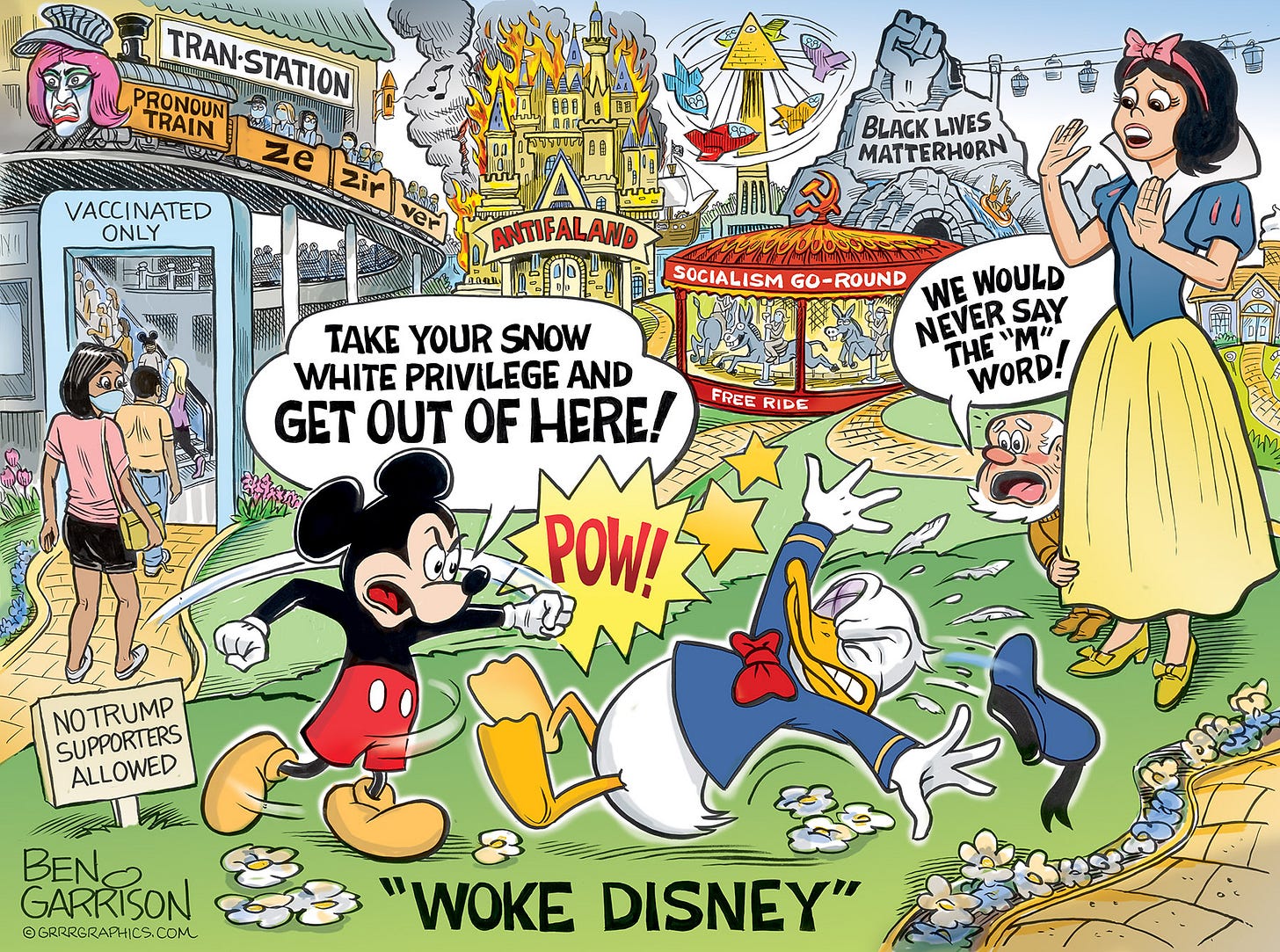CORPORATE WOKEISM
Does it Make Sense?
Boycotts
People have made their opinions known to companies for years by not patronizing their businesses. While it might feel good, often, too few people are willing to give up the product/service, so the impact on the corporate bottom line is negligible. Many gun owners refuse to buy Levis, but that hasn’t stopped most people from buying the most popular jeans on the planet.
However, with social media highlighting the new-found wokeism of corporate boards, this “worm” may have turned. It turns out that most people don’t want companies to be all that political.
The Disney Effect
No one associates guns and Levis. However, we do think of Disney as the child-focused entertainment capital of the world. Between the parks, the movies and their channel, parents have trusted the Mouse to provide parent-approved content that they can feel good about. Brand matters.
Disney’s recent response to Florida’s attempt to rein in sexually explicit education to youngsters has damaged their brand. Just as Netflix was punished for sexualizing children in “Cuties,” Disney is now reaping the whirlwind for promising to include more sexual content in their children’s fare.
“Reimagine Tomorrow” is exemplified by a recent statement from a Disney exec.
“The entertainment giant works to make underrepresented groups, such as racial minorities and the LGBTQ community, account for at least 50 percent of its regular characters by the end of the year.
Karey Burke, president of Disney’s General Entertainment Content, said the company must do more to make its content more inclusive in a company-wide Zoom call Monday that was later posted to Twitter.
“I’m here as a mother of two queer children, actually,” Burke said on the call. “One transgender child and one pansexual child, and also as a leader.”
Burke said she supports featuring “many, many” characters who are LGBTQIA, which stands for lesbian, gay, bisexual, transgender, queer (or questioning), intersex, and asexual (or allies).”
What’s the problem here? Very simply, even a child who thinks they are more boy than girl isn’t actually thinking of this in a sexual way. Just as many girls I knew were tomboys, it is exciting and tempting for some to emulate the sex they are not. Many boys have no interest in sports and might prefer to become the chess champion, or the next fashion designer. Defying stereotypes is normal, healthy and unsurprising.
But how would Disney showcase the LGBTQ community? For many years, there have been gender-defying characters in movies, so that alone cannot be their strategy. Parents do not want an emphasis on the sexual, nor do they want the experimentation of children to turn into adult reality through coaching, hormones or surgery. Tomboys can grow up to be world leaders or happy mothers in a mainstream household. The geeky boy who eschews sports might be the next internet billionaire. Early interests in atypical behavior doesn’t mean that a sex change is wise.
The Impact to Brand
Disneyland has always been a magical place where if you drop $5, anyone around will tap you on the shoulder and return it to you. The ever-present “elves” who pick up trash you drop embarrass slobs into better behavior. It’s a clean, nice place where your children’s dreams come true and even the adults can pretend for a while that the world is a cleaner, nicer place.
That is the Disney brand. By getting into woke politics, which actually represented the views of a minority of their employees (and probably few of their stockholders), they’ve damaged their brand. Instead, they could simply have included more diversity in their imagery without calling it out as a way of complying with some minority demand to embrace DIE principles (diversity, inclusion and equity). And by keeping the “sex” out of it.
The impact to their bottom line is only beginning. It seems likely that their special tax carveouts in Florida weren’t known to many taxpayers. The popularity of cutting them leaves Disney in tough spot. They can’t move the park. That would cost billions. But perhaps more people will decide to find other places to vacation.
Subtlety is Always Better, As is Forethought
Before launching into public proclamations of “virtue,” companies need to understand what it is they sell and what their brand represents. Keeping out of politics is always a better play, if they can manage it. Internally, they can make commitments to hire more broadly, while still focusing on getting great candidates. But corporate-issued statements can damage their bottom lines, even if they mistakenly believe this is what “everyone” wants. For many years, companies tried to stay out of the political limelight. That was a good idea and perhaps, they should get back to their business instead.
Take internal action, if you choose to, but watch what you broadcast. As parents have shown in regaining power over teachers’ unions, people are beginning to make more considered choices based on the stance a company takes. And there are more and more choices to make. Stick to business and while you might upset some of your employees, refusing to cave to extremist views will serve everyone – employees, customers and shareholders – far better.



I've often thought some stockholder initiatives are in order as well, although, hard to orchestrate. A shareholder wants the company to make money and pay dividends and grow the business. Hurting the brand or spending company dollars on political activism, to me, is a dereliction of their fiduciary responsibility.